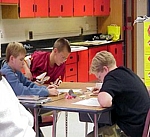Classroom Educational Programs
 Through hands on educational programs, teachers and school children are exposed to rocks and minerals, how we obtain them by mining, what they are used for, and what is done when mining is complete to restore the land (reclamation). This is accomplished through teacher training at conferences and in service training, and classroom visits for school children of all ages; utilizing many fun hands on activities. The goal of the Mining Programs outreach and educational participation is to educate and inform citizens of all age levels in a fun and meaningful way.
Through hands on educational programs, teachers and school children are exposed to rocks and minerals, how we obtain them by mining, what they are used for, and what is done when mining is complete to restore the land (reclamation). This is accomplished through teacher training at conferences and in service training, and classroom visits for school children of all ages; utilizing many fun hands on activities. The goal of the Mining Programs outreach and educational participation is to educate and inform citizens of all age levels in a fun and meaningful way.
Annual Mine Tour
On May 15, 2018 the Bureau of Mines hosted a mine tour for three bus loads of sixth graders from the Mount Savage Middle School. We toured reclaimed mine sites and one active mine, the Tri-Star mine near Barton, MD. This has become an annual event with a new group of sixth graders each year. On the buses as we travel, we discuss coal mining today versus the mining of years past. Tri-Star Mining deserves an accolade for allowing us to tour their mine and providing a supervisory employee to assist us during our discussions. Below are two pictures.
For more information on MDE class and field presentations and availability for teacher in service training, contact Molly Michaelson, at [email protected]
Watershed Programs Support
The Maryland Mining Program (Coal and nonCoal divisions) also is very supportive of local watershed groups. Watershed groups are important partners with state agencies and educational institutions to protect watershed areas and habitats. Not only is technical support often provided to aid the volunteers in understanding the problems they have encountered in their watershed (when related to mining), but equipment is often provided to help them accomplish the water quality sampling most programs develop. This water sampling is beneficial to both the Watershed groups and the Mining Program. By allowing the watershed groups to collect and monitor the water quality within their watershed of interest, the Mining Program is often rewarded with regular sampling data. This allows personnel to keep track of changes in the watershed and, in some cases, help support water remediation project proposals.